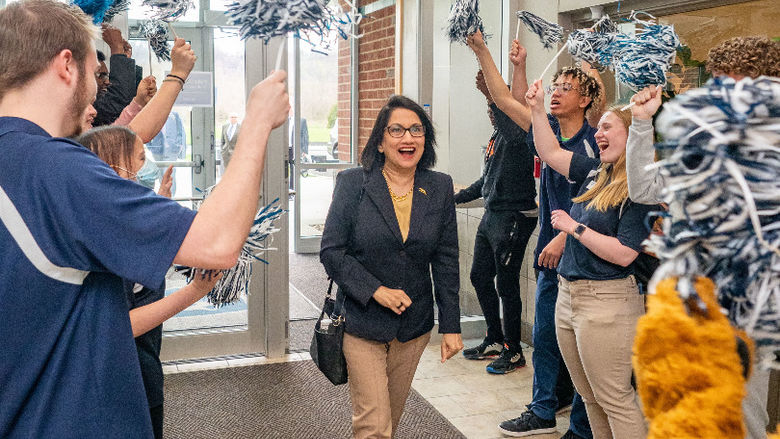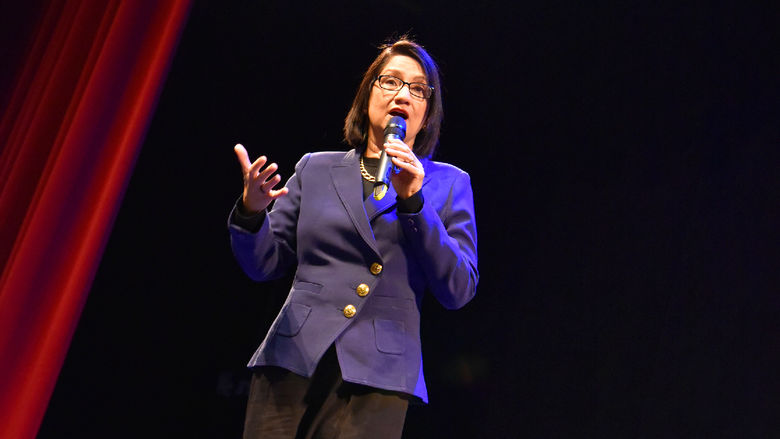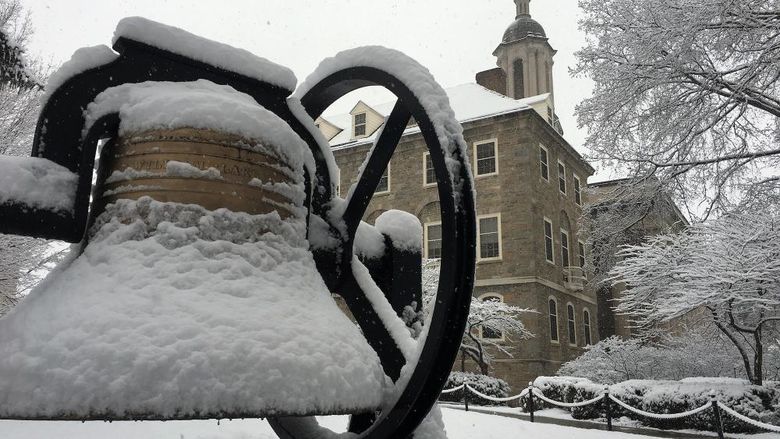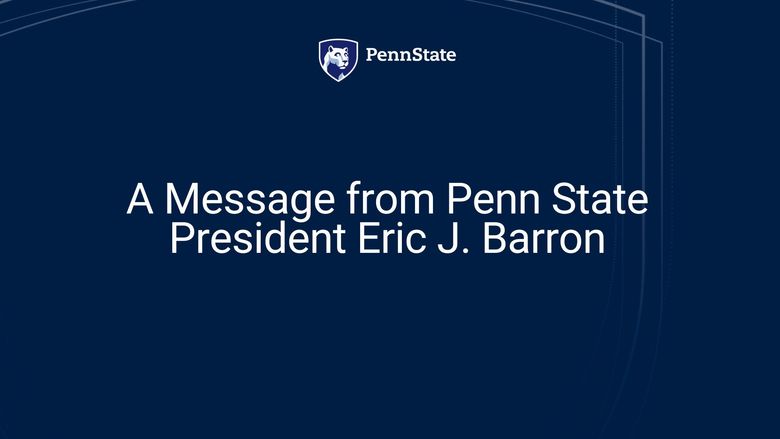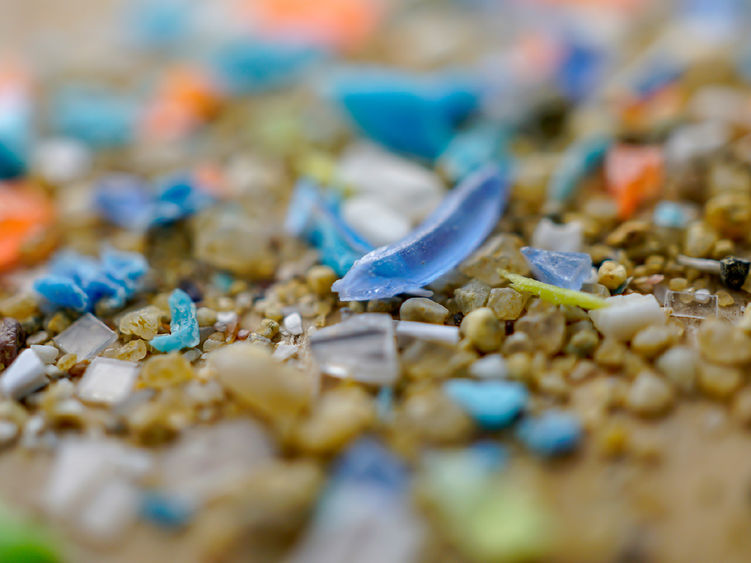
Conducting research and outreach related to microplastic pollution in the Delaware River Watershed is one of the projects funded by the inaugural Penn State Presidential Public Impact Research Awards program.
UNIVERSITY PARK, Pa. — Penn State announced today (June 4) the recipients of the inaugural Presidential Public Impact Research Awards (PPIRA), a new program designed to support faculty and students who are working on research projects that directly benefit communities.
The program, with funding totaling nearly $700,000 from Penn State President Neeli Bendapudi’s office, the Office of the Senior Vice President for Research, and Penn State's Evidence-to-Impact Collaborative, recognizes and supports teams of two to four faculty members and their graduate or undergraduate students across the Commonwealth Campuses who are already conducting research that benefits their communities alongside community partners. The award provides up to $10,000 for each faculty member (up to $40,000) — in the form of summer support — and $3,500 for each student on the team.
Assistance will be provided to apply for additional external funding, bolstered by the University’s partnership with The Pew Charitable Trusts’ Transforming Evidence Funders Network.
“Penn State’s Commonwealth Campuses are uniquely positioned to partner on the local level to conduct scholarship that makes a profound difference in the communities we serve,” said Bendapudi. “The Presidential Public Impact Research Award program recognizes the vital work being undertaken by faculty and researchers at our campuses, while investing the University’s resources in continuing to enrich communities and empower residents across Pennsylvania. As a leading research university committed to public service, Penn State is proud to advance public impact research across the commonwealth.”
Due to an incredible number of competitive proposals and overwhelming support from the administration, two cohorts have been selected, one for the 2024-2025 period, and a second for the 2025-2026 period, collectively originating from 11 Commonwealth Campuses.
Faculty Awardees for 2024-2025 include:
-
Jill Felker (Penn State Berks) with Shirley Clark (Penn State Harrisburg), Tami Mysliwiec (Penn State Berks) and Lisa Emili (Penn State Altoona) for “Microplastic Pollution Research and Outreach in the Delaware River Watershed in Reading, Pennsylvania” (Partner: PA Department of Conservation and Natural Resources)
-
Jennifer Murphy (Penn State Berks) with Brenda Russell (Penn State Berks) for “Community Impact of Harm Reduction Vending Machines” (Partner: Council on Chemical Abuse)
-
Maryam Roshanaei (Penn State Abington) with Jennifer Breese (Penn State Greater Allegheny) and Brian Gardner (Penn State Schuylkill) for “Enhancing Cybersecurity Readiness in Non-Profit Organizations Through Collaborative Research and Innovation” (Partner: PA Association of Non-Profit Organizations)
-
Nonna Sorokina (Penn State Scranton) with Dusan Ramljak (Penn State Great Valley) for “Data-Driven Response to High Opioid Abuse Impact: Leveraging Machine Learning, AI, Health, Social and Economic Determinants” (Partner: Federal Reserve Bank of Philadelphia)
-
Michele Tantardini (Penn State Harrisburg) with Göktuğ Morçöl (Penn State Harrisburg) and Mohammad Ali (Penn State Harrisburg) for “Transitioning to Green Jobs in Pennsylvania” (Partner: South Central Workforce Development Board)
Faculty Awardees for 2025-2026 include:
-
Richard Harnish (Penn State New Kensington) with Joy Krumenacker (Penn State New Kensington) and Jennifer Croyle (Penn State Greater Allegheny) for “Exploring Community Mental Health & Wellness Needs: A Focus Group Proposal” (Partner: Wesley Family Services)
-
Daniel Mallinson (Penn State Harrisburg) with Sara Imanpour (Penn State Harrisburg) and Patricia Aguilera-Hermida (Penn State Harrisburg) for “Understanding the Effects of a New Approach: Program Evaluation of Behavioral Intervention in the Steelton-HighSpire School District” (Partner: Youth Counseling Services, LLC)
-
Joseph Ranalli (Penn State Hazleton) with William Yourey (Penn State Hazleton) and Bhanu Babaiahgari (Penn State Hazleton) for “Empowering Families for Energy Reduction (EFER)” (Partner: Hazleton Integration Project)
-
Juyoung Song (Penn State Schuylkill) with Joseph Squillace (Penn State Schuylkill) and Hakan Can (Penn State Schuylkill) for “Identifying Risk Factors and Protective Factors of Cyberbullying Behaviors in Rural Areas by Using Machine Learning Analysis” (Partner: Pottsville Area High School, Schuylkill Haven Area School District)
-
Luna Yang (Penn State Brandywine) with Anna Sigmon (Penn State Brandywine), Ahmed Nuriye (Penn State Abington) and Christine Allen (Penn State Brandywine) for “Preparing a Scientific Workforce to Support the Economic Development and Talent Retention of the Southeastern PA region” (Partners: Chester County Chamber of Commerce, Mainline Chamber of Commerce, Philadelphia Section of the American Chemical Society, & Delaware County Workforce Development Board)
All awardees will incorporate student experiential learning opportunities as well as directly engage and support with a local partner, such as nonprofits, school districts, chambers of commerce and workforce development organizations.
As a public land-grant institution, Penn State’s faculty, staff and students have always conducted research that serves the greater good, and the PPIRA program is part of Penn State's broader commitment to public impact research. Now, by committing to the PPIRA program, the University aims to provide even more support to researchers and students at its Commonwealth Campuses who are conducting impactful work that benefits communities and improves the well-being of local residents.
“The PPIRA program aligns closely with our broader engagement with national and international partners aiming to drive scholarship toward real-world impact and serve critical community needs,” said Max Crowley, director of the Penn State's Evidence-to-Impact Collaborative, the organization that has taken the lead in developing this program. “We’re thrilled to move forward with support for 10 excellent research proposals that emphasize interdisciplinary approaches, that authentically engage community partners, and that meaningfully incorporate student engagement in the research process. Ultimately, we hope the Penn State investment will help to position the recipients to be competitive for external funding from foundations or federal and state agencies.”
